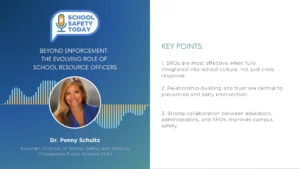EdTech AI Is About to Get Much Smarter
Big news this week from Digital Promise—it will co-lead a new five-year, $20 million initiative aimed at creating artificial intelligence (AI) tools to advance human learning and education. In this episode of EdTech Today, Jeremy Roschelle, Executive Director of Learning Sciences Research at Digital Promise and one of the co-Principal Investigators (PIs) of the NSF grant, explains what this phase change will mean for future learning tools.
The NSF AI Institute for Engaged Learning will produce transformative advances in STEM teaching and learning by bringing together a team that includes researchers from four universities (North Carolina State University, Indiana University, University of North Carolina at Chapel Hill, and Vanderbilt University). Digital Promise will bring its learning sciences researchers as well as educational practitioners, policy makers, and product developers into the work and ensure the knowledge is broadly communicated. The investment is part of a broader effort by NSF to advance our understanding of AI technologies and how they can drive innovation to address real-world challenges.
“We’re energized to create a nexus of activity and communication to strongly involve educators, policy makers, innovators, and additional researchers in defining the future of engaged learning with AI,” said Jeremy Roschelle, executive director of learning sciences research at Digital Promise and one of the co-Principal Investigators (PIs) of the NSF grant.
The institute will focus on three areas that complement each other. First, the institute will create AI platforms that generate interactive story-based problem scenarios that foster communication, teamwork and creativity as part of the learning process. Second, the institute will create AI characters capable of communicating with students through their speech, facial expression, gesture, gaze and posture. These characters, or “agents,” will be designed using state-of-the-art advances in AI research to foster interactions that engage students effectively in the learning process. Lastly, the institute will create a sophisticated analytics framework that analyzes data from students in order to make the tools truly interactive.
In other words, the system will be able to customize educational scenarios and processes to help students learn, based on information the system collects from the conversations, gaze, facial expressions, gestures, and postures of students as they interact with each other, with teachers, and with the technology itself.
Researchers involved with the institute will work with a broad range of stakeholders, including schools, museums, and nonprofit organizations. This collaborative approach is designed to ensure that the institute creates tools that can be used to meet educational goals while also ensuring its AI-driven learning environments are ethically designed and promote diversity, equity, and inclusion.
“Building on our strong commitment to equity and inclusion, Digital Promise will facilitate vigorous engagement of educators, policy makers, edtech developers, and other stakeholders in the institute’s contribution to a future for learning technology that minimizes bias, increases fairness, emphasizes transparency, and builds on the personal and cultural assets of diverse learners,” says Roschelle.
Over its nearly 10-year history, Digital Promise has created the nation’s leading networks where educators, innovators, and researchers come together to realize the promise of digital technology for improving teaching and learning. Due to the importance that AI and emerging technologies will have in the next decade, Digital Promise is leading a portfolio of related projects to develop the research-based guidance that will be needed for emerging technologies to make a positive difference in education.
Listen to Previous Episodes of EdTech Today!
Follow us on social media for the latest updates in B2B!
Twitter – @MarketScale
Facebook – facebook.com/marketscale
LinkedIn – linkedin.com/company/marketscale








